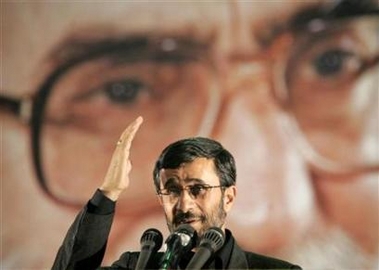Top News
Iran: Atomic work will go on despite deadline
(Reuters)
Updated: 2006-08-28 06:37
 |
Large Medium Small |
Iran said on Sunday it would never stop uranium enrichment despite a looming U.N. deadline designed to ensure it cannot develop nuclear weapons.
|
|
"Iran will continue its uranium enrichment. We want to produce our own nuclear fuel," Larijani was quoted as saying by the student news agency ISNA. "We will never stop it."
The U.N. Security Council has told Iran to suspend atomic fuel work by August 31 or face possible sanctions. The West suspects Iran is secretly trying to make nuclear weapons but Tehran says its only aim is to generate electricity.
Uranium enrichment can be used to produce fuel for nuclear power stations or material for nuclear bombs.
The Islamic Republic says international sanctions would only propel oil prices higher still, damaging the economies of the industrialised world.
"Any measure to deprive Iran of its right will not change our mind about our aim," said Larijani.
Iran on Sunday tested a long-range, radar-evading missile called Sagheb (Piercing) during war games in the Gulf. Analysts have viewed such moves in the past as a signal Iran could disrupt oil shipping routes if the atomic dispute escalated.
The United States has threatened swift action on sanctions after August 31 if Iran does not heed the U.N. demand. But analysts say divisions between the six major powers may delay any punitive measures.
Britain, Germany and France have been more cautious in public than Washington about sanctions. Russia and China, both major trading partners with Iran, have been unwilling to impose sanctions and could veto such a move in the Security Council.
ITALIAN INTEREST
Italian Foreign Minister Massimo D'Alema said in a newspaper interview Rome wanted to join talks with Tehran being led by the six major powers. Italy has strong trade ties with Iran.
Iran said U.N. Secretary-General Kofi Annan would visit Tehran on September 2, two days after the U.N. deadline expires.
Last Tuesday, Iran responded formally to the package of incentives proposed by the six powers. It said the 21-page document contained ideas that would allow serious talks, but gave no sign it was prepared to halt or suspend enrichment.
"I repeat that Iran is fully prepared to hold constructive and fair talks anywhere and anytime with the foreign ministers of the (six major powers) over ... the nuclear issue," state television quoted Larijani as saying.
Israeli Foreign Minister Tzipi Livni said: "The world must not delude itself that Iran seeks some sort of real dialogue. They want to buy time. They must not be allowed to do so. Sanctions must be under way. The sooner, the better."
The group of six say they will hold off on any action until after an August 31 report by the U.N. nuclear watchdog, the International Atomic Energy Agency (IAEA), that will judge whether Iran has halted enrichment-related activity or not.
Diplomats close to the Vienna-based IAEA say the verdict is all but inevitable -- Iranian nuclear activity continues -- but that the West could not reasonably have expected otherwise.
"A lot of the media focus has been on Iran's offer being unacceptable because it didn't include the upfront agreement to suspend enrichment," said one diplomat, declining to be named.
"But no one, from (U.S. ambassador to the United Nations) John Bolton to Cinderella's fairy godmother, actually expected that to happen," said the diplomat.
"What Iran did offer -- a thoughtful counter-proposal that did not rule out suspension as part of negotiations -- was as positive as anyone could have hoped for."
European Union foreign policy chief Javier Solana said on Friday he would meet Larijani in coming days to discuss "new elements" raised in Iran's response.
